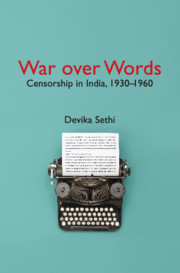Book contents
- Frontmatter
- Dedication
- Contents
- Acknowledgements
- List of Abbreviations
- Introduction
- Part I Guarding the State, Protecting the Public: Censorship Policies and Practices in the 1930s
- Part II Protests and Publicity: Banning Non-Indian Authors
- Part III Political or Military? Censorship in India during the Second World War
- Part IV The Censored Turn Censors: Freedom and Free Speech
- 7 Free Speech or Hate Speech? Partition and Censorship
- 8 ‘An Education in Realism’: The First Amendment to the Indian Constitution
- 9 The Living Biographies of Religious Leaders Controversy (1956)
- Conclusion
- Epilogue
- Bibliography
- Name Index
- General Index
7 - Free Speech or Hate Speech? Partition and Censorship
from Part IV - The Censored Turn Censors: Freedom and Free Speech
Published online by Cambridge University Press: 26 April 2019
- Frontmatter
- Dedication
- Contents
- Acknowledgements
- List of Abbreviations
- Introduction
- Part I Guarding the State, Protecting the Public: Censorship Policies and Practices in the 1930s
- Part II Protests and Publicity: Banning Non-Indian Authors
- Part III Political or Military? Censorship in India during the Second World War
- Part IV The Censored Turn Censors: Freedom and Free Speech
- 7 Free Speech or Hate Speech? Partition and Censorship
- 8 ‘An Education in Realism’: The First Amendment to the Indian Constitution
- 9 The Living Biographies of Religious Leaders Controversy (1956)
- Conclusion
- Epilogue
- Bibliography
- Name Index
- General Index
Summary
The colonial state believed that hate literature with communal overtones caused communal riots. The GOI estimated that between 1923 and 1930 approximately 450 people had been killed and 5,000 injured in communal riots in India. In an official memorandum submitted to the Indian Statutory Commission in 1930 (better known as the Simon Commission), the GOI noted that the Kohat riots in NWFP in September 1924, in which 36 people died, were caused by the circulation of a ‘violent anti-Islamic poem’. It observed that during the Calcutta riots in 1926 inflammatory printed leaflets were circulated by Hindus as well as Muslims, and hooligans were hired; the Bengal government believed that ‘money was being spent to keep the fight going’. The GOI thus held ‘partisan writing in the press’ responsible for fanning communal feeling. In the province of Punjab as well, the GOI noted in 1930:
… communal writing of an extremely provocative type has assumed serious proportions and has been greatly responsible for exacerbating communal feeling. Not a few papers are said to owe their circulation almost entirely to the virulence of their attacks on the rival community.
Having made this causal connection even before 1930, the GOI took legal steps to curb hate literature (that is, to facilitate punitive action against it). In August 1926 the GOI amended the CrPC to enable authorities to confiscate publications that promoted enmity or hatred among its subjects; a year later, in August 1927, it amended the IPC, making it a specific offence ‘deliberately and maliciously to insult the religion or the religious beliefs of any class of His Majesty's subjects’. This second legislation was prompted when the Punjab High Court took a decision acquitting the publisher of the notorious pamphlet Rangila Rasul.
In the eyes of state personnel, this causal connection (between what people read about another religious community and how they later behaved towards members of that community) was one that was reinforced during events leading up to and accompanying the Partition of India and the attendant communal riots. Eyewitness accounts of the Partition confirm this view. The writer Krishna Sobti blamed religious revivalist movements (such as the Arya Samaj) and the vernacular press in the Punjab for exacerbating tensions.
- Type
- Chapter
- Information
- War over Words , pp. 175 - 199Publisher: Cambridge University PressPrint publication year: 2019



